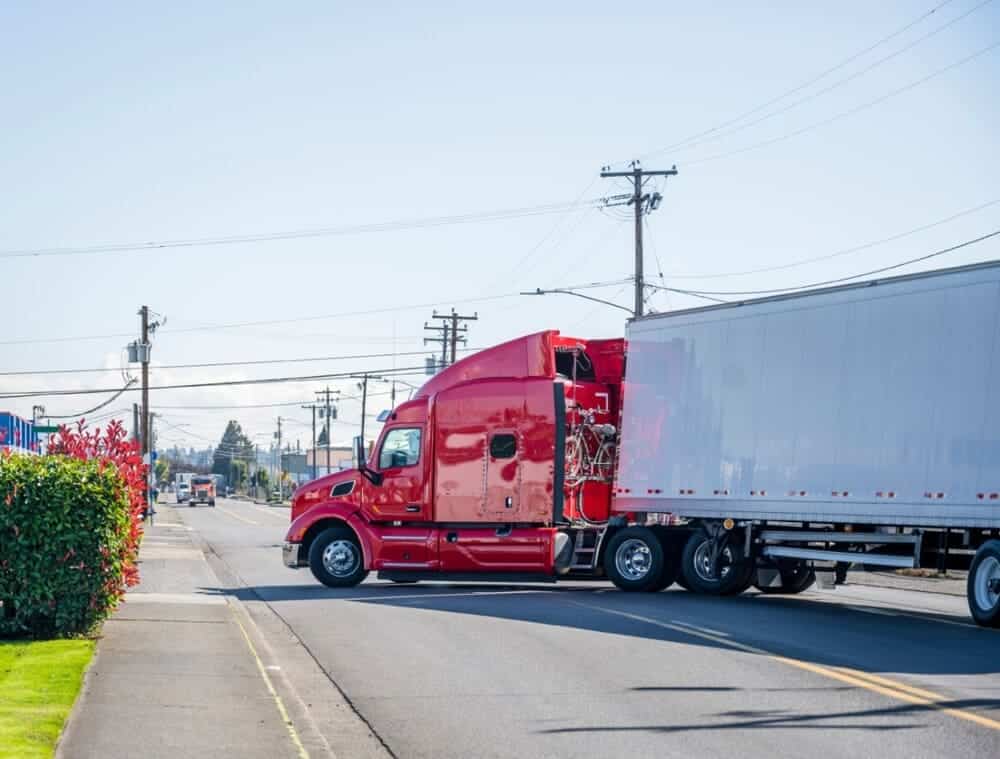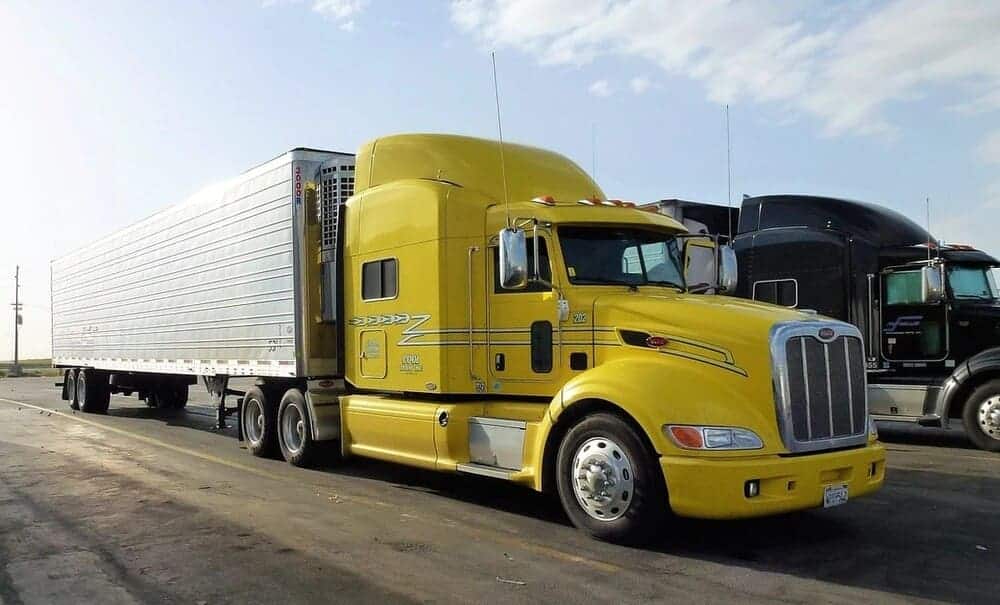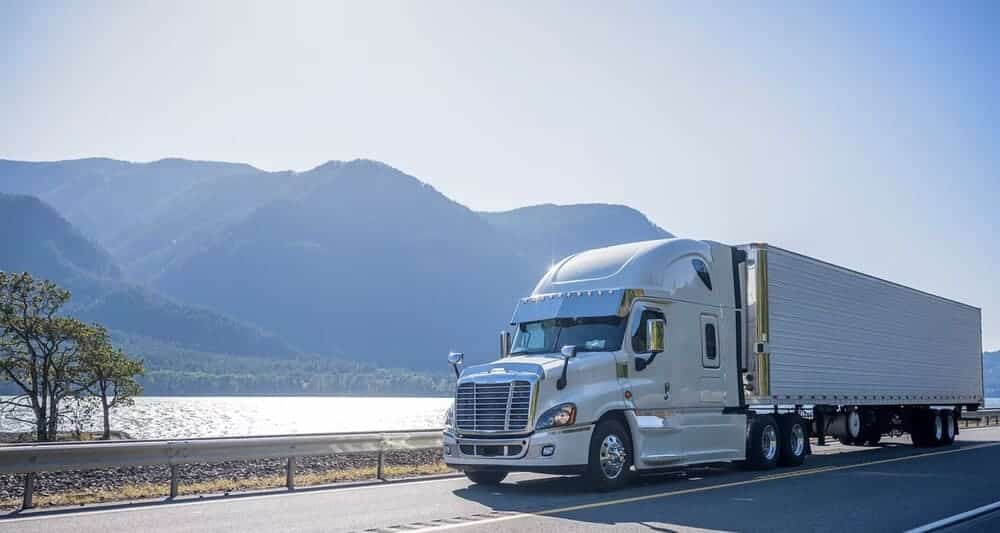

August 9, 2023

2213 Views

9 min read
Can a Child Ride in a Commercial Truck
Page Contents
Once you start your career as a commercial truck driver, you’ll quickly realize how isolating it can be. Drivers have to work long hours, and some spend more than a week out of town. They often have doubts about whether they can bring their family members, such as a child, on the road.
But do truckers have the right to bring their families with them on over-the-road trips in 2024? In most cases, the answer is yes. There are still factors that can affect the feasibility of bringing a child passenger on board.
Is It Legal for Your Child to Ride in A Truck? What The Law Says
It is not prohibited by either federal or state laws to have a child as a passenger in a commercial truck but you still should be cautious. Different trucking companies have unique passenger policies that determine how many people can be in a semi-truck. Some of them require the passengers to be 18 years old and above. These age restrictions are aimed at protecting younger individuals who may not have the needed maturity and comprehension in such an environment.
Bringing your child in your commercial truck means careful consideration of three essential factors.
You Must Have the Right Insurance for Your Passenger
Planning a trip with your child requires supplementary insurance coverage from your company or insurance provider. In most instances, companies will ask you to sign a waiver that releases your employer from any potential legal obligations if the child is hurt while inside the truck.
Any Passengers, Especially Babies, And Children Must Be Secured When Driving
Although seat belt usage regulations vary by state, in most cases, safety belts must be worn by all passengers in the front seats of a vehicle. The laws regarding car seats vary between states as well. They are applicable not just to conventional cars, but also to trucks.
If You Drive for A Commercial Company, DOT Requires Authorization For Your Passengers
It’s crucial to follow Department of Transportation (DOT) regulations if you’re employed as a driver for a company. You are required to have written authorization from your motor carrier to transport passengers as per the DoT guidelines. It’s advised that your employer retains this authorization, and you keep a copy with you while driving.

Can Drivers Let Their Child Ride in The Front Seat Of A Single Cab Commercial Truck?
Having a passenger in your truck while driving is a matter of various factors, mostly determined by the policies of your employer. While federal law doesn’t prohibit children from being passengers in commercial trucks, certain trucking companies may have regulations to guarantee safety and protect all parties involved.
Ask about your company’s passenger policies as they vary from company to company. Disclosing travel details, such as dates, itineraries, and destinations, getting company-approved passenger insurance, achieving a minimum driver tenure requirement, and setting age requirements are just some of the requirements.
Before allowing your kids to ride in your truck, it’s important to obtain written authorization from your employer. Riding in a commercial truck without proper authorization is both against company policy and the law. Filling out paperwork and completing documents for child passengers, such as insurance information, are typical steps in obtaining authorization.
If you are an owner-operator, you have more liberty than truckers who work for larger companies as you can set your own rules for passengers. However, having adequate insurance coverage for your child is a must before the journey starts. It is recommended to consult with your insurance company.
The First Rule for Child Passengers in a Commercial Truck: Put Them in A Car Seat or A Booster Seat
Before letting your child ride in your truck, consider their safety first. Your child should sit in the front seat in semi-trucks because, unlike regular cars, most of them don’t have airbags in the cab. Remember that according to federal law, a car seat or booster seat is required for all children under 12 while the vehicle is in motion.
To clarify, it is illegal for a child to ride in a truck without the necessary safety precautions — booster seats or car seats are required for younger children, while older children should use seat belts. Your child’s safety needs to come first, even with the limited space in the truck’s cab. Always have them in a car seat when riding in your truck.

How to Install a Child Seat on The Front Seat of a Truck
Maximizing your child’s safety during the journey requires the proper installation of their car seat. However, it may be tough to install most child safety seats in a truck without a back seat since they’re designed for use in regular cars. A child can still ride in a single cab truck but it’s important to remember that keeping your child in a booster seat or properly installed car seat can make a significant difference in case of an accident.
Here are some things to keep in mind when installing a child’s seat on the front seat of your truck.
- Check that the seat in your truck’s cab provides a minimum of 85% support to the car seat base. If it does not meet your expectations, think about finding another safety device for your child.
- Forward-facing car seats are a good choice for most young children under five. Ensure that such a seat is secured using the top tether and other anchors. If needed, you can use the anchor points or the webbing loops within your truck.
- If there is a baby or infant on board and the truck is equipped with active airbags, rear-facing seats must be used. It is possible to install a rear-facing seat in trucks without a back seat, just like you would in a regular car.
- The cab seat should be secured with booster seats so the child can ride in your truck while properly wearing a shoulder or lap belt.
When securing the car seat inside the semi-truck cabin for your child, it’s crucial to always adhere to the manufacturer’s instructions and follow the guidelines established by the FMCSA. Regularly inspect the car seat to make sure it stays securely fastened throughout the journey.

FOR COMPREHENSIVE FLEET
MANAGEMENT SOLUTIONS
The Best Way to Travel with A Baby or Children in Your Truck
You have done what is necessary to permit your child to ride in the front seat of your single-cab truck — completed the required paperwork, spoken to your insurance provider, and installed a car seat. Is there anything else you need to take into account?
Having a passenger, particularly a baby or a child, in your truck can have a different impact on your journey than traveling alone. It’s important to think about how to handle life on the road with a child as your passenger.
When riding with your child, it’s important to remember these things:
Comfort
Prioritize your child’s comfort during the ride: consider how long they can stay comfortable in the small cab of a truck and be aware that children require more time to be active than adults. Plan for more frequent stops along the way, so that your child can stretch, move around, and take breaks, particularly after a long drive.
Safety
How can you ensure that your baby or child is safe while on the road? While we have already talked about the importance of car seats and other safety measures while riding, there is more to think about. Make sure your child’s safety is prioritized when stopping and taking breaks at restaurants, truck stops, and your final destination. Always watch your child closely, regardless of where you are.
Fun
Even if it’s not feasible to completely alter your itinerary to cater to your child’s every moment, you can still have a great time together. Plan out interesting stops to make during your journey or drive through scenic areas. Besides, prepare or carry activities that you can enjoy together in the truck while driving, such as books, games, music, or podcasts.

Drive Together, Grow Together
Bringing your child on your next trip is a good idea for several reasons. Certain parents, especially those who are single, may require it. Others choose to travel with their children to combat loneliness while on the road. But the main reason for including your children is to gain a priceless experience.
Trucking with your child offers an opportunity for in-person bonding and has a lot of other benefits. Your kids get to see firsthand what you do for a living and experience the thrill of driving a large truck. It enables them to explore and discover new and exciting places. Creating lasting memories that you will cherish for a lifetime is what’s most important.
Furthermore, having a child in certain trucking situations can be a great advantage for a driver. Seeing a young person accompanying the driver helps improve the mood of some companies or clients who are having a challenging day. Additionally, clients may better understand that drivers are individuals with families to support. Giving a first-hand explanation of a driver’s job (i.e., their family) can offer other customers or clients alternative viewpoints on the trucking industry.
The most important thing is to evaluate your child’s happiness while driving. It’s impossible to change your route or risk a delay because of your child’s unhappiness, but you could still make efforts to keep them entertained and content. When it becomes clear that your child is not capable of going on a road trip, avoid putting them in that situation.
FleetCare: Taking Care of Truck Drivers in Every Way
A truck ride with a child can be a great way to stay connected to your family and create cherished memories. Your child will remember a journey with their parents forever.
The well-being of truckers is our top priority at FleetCare. Our support extends to dispatcher services, compliance with FMCSA/DoT requirements, or answering frequently asked questions.
Our goal is to assist you in becoming a better and more successful truck driver. That’s why FleetCare is ready to provide you with the resources, knowledge, and support you need for a journey no matter where you are or what driving routes you take.
Sign up for Exclusive Trucking Tips
Test







